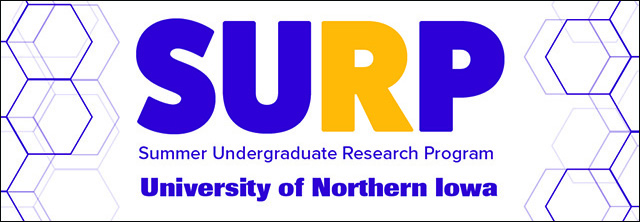
2021 Summer Undergraduate Research Program (SURP) Symposium
Enterococcus faecalis Colonization of the Helicoverpa zea Midgut Epithelium
Location
Ballroom, Maucker Student Union, University of Northern Iowa
Presentation Type
Poster Presentation (Electronic Copy Not Available)
Document Type
poster
Abstract
In recent years, there has been a surge in interdisciplinary efforts to elucidate the nutrient acquisition mechanisms that contribute to the success of a bacterium to not only survive in the gastrointestinal tract (G.I.) of Lepidopteran insects, but rather to thrive in it. However, bacterial colonization of Lepidoptera, one of the largest insect orders containing over 180,000 species is, to this day, poorly understood. Most of the works describing intestinal colonization have employed methods that inoculate larvae with an excessive number of bacteria relative to their natural abundance in the G.I. tract and/or disregarded key principles laid forth in Freter’s nutrient niche hypothesis which asserts that nutrient availability drives successful colonization. We developed a feeding bioassay using diet amended with rifampin to non-invasively introduce Enterococcus faecalis OG1RF into the Helicoverpa zea (corn earworm) G.I. tract in a single dose. We quantified E. faecalis populations using fecal plate counting. Preliminary results suggest that the continuous administration of artificial diet amended with 50 μg/mL rifampin opens a nutrient niche for E. faecalis to colonize at approximately 106 CFU/g frass (feces), whereas E. faecalis populations in solvent and negative control groups steadily declined. Collectively, this data supports a role for rifampin in suppressing susceptible endogenous bacteria and, subsequently, permitting stable colonization of E. faecalis OG1RF. Future works will continue optimizing this feeding protocol and characterize the role of metabolic pathways in colonization of isogenic E. faecalis mutants.
Start Date
30-7-2021 11:30 AM
End Date
30-7-2021 1:15 PM
Event Host
Summer Undergraduate Research Program, University of Northern Iowa
Faculty Advisor
Jerreme Jackson
Department
Department of Biology
Copyright
©2021 Sierra Hill and Jerreme Jackson
File Format
application/pdf
Recommended Citation
Hill, Sierra and Jackson, Jerreme, "Enterococcus faecalis Colonization of the Helicoverpa zea Midgut Epithelium" (2021). Summer Undergraduate Research Program (SURP) Symposium. 13.
https://scholarworks.uni.edu/surp/2021/all/13
Enterococcus faecalis Colonization of the Helicoverpa zea Midgut Epithelium
Ballroom, Maucker Student Union, University of Northern Iowa
In recent years, there has been a surge in interdisciplinary efforts to elucidate the nutrient acquisition mechanisms that contribute to the success of a bacterium to not only survive in the gastrointestinal tract (G.I.) of Lepidopteran insects, but rather to thrive in it. However, bacterial colonization of Lepidoptera, one of the largest insect orders containing over 180,000 species is, to this day, poorly understood. Most of the works describing intestinal colonization have employed methods that inoculate larvae with an excessive number of bacteria relative to their natural abundance in the G.I. tract and/or disregarded key principles laid forth in Freter’s nutrient niche hypothesis which asserts that nutrient availability drives successful colonization. We developed a feeding bioassay using diet amended with rifampin to non-invasively introduce Enterococcus faecalis OG1RF into the Helicoverpa zea (corn earworm) G.I. tract in a single dose. We quantified E. faecalis populations using fecal plate counting. Preliminary results suggest that the continuous administration of artificial diet amended with 50 μg/mL rifampin opens a nutrient niche for E. faecalis to colonize at approximately 106 CFU/g frass (feces), whereas E. faecalis populations in solvent and negative control groups steadily declined. Collectively, this data supports a role for rifampin in suppressing susceptible endogenous bacteria and, subsequently, permitting stable colonization of E. faecalis OG1RF. Future works will continue optimizing this feeding protocol and characterize the role of metabolic pathways in colonization of isogenic E. faecalis mutants.


